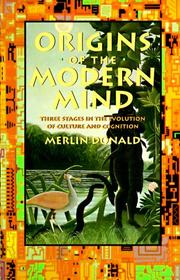| Listing 1 - 2 of 2 |
Sort by
|

ISBN: 0674644840 0674644832 9780674644847 9780674644830 Year: 1991 Publisher: Cambridge, Mass. London Harvard University Press
Abstract | Keywords | Export | Availability | Bookmark
 Loading...
Loading...Choose an application
- Reference Manager
- EndNote
- RefWorks (Direct export to RefWorks)
This bold and brilliant book asks the ultimate question of the life sciences: How did the human mind acquire its incomparable power? In seeking the answer, Merlin Donald traces the evolution of human culture and cognition from primitive apes to artificial intelligence, presenting an enterprising and original theory of how the human mind evolved from its presymbolic form.
Cognition and culture --- Neuropsychology --- Cognition --- Intellect --- History --- Cognitie en cultuur --- Psychologie [Neuro] --- Human intelligence --- Cognition et culture --- Intelligence --- Neuropsychologie --- History. --- Histoire --- Biological Evolution --- Cultural Evolution --- Neurophysiology --- Psychophysiology --- Culture and cognition --- Culture --- Ethnophilosophy --- Ethnopsychology --- Socialization --- Psychology --- Neuropsychologies --- Neuropsychiatry --- Evolution, Cultural --- Cultural Evolutions --- Evolutions, Cultural --- Cognitive Function --- Cognitions --- Cognitive Functions --- Function, Cognitive --- Functions, Cognitive --- Evolution, Biological --- Sociobiology --- Mind --- Ability --- Thought and thinking --- Cognitive psychology --- Biological anthropology. Palaeoanthropology --- Philosophy and psychology of culture --- Cognition and culture. --- Cognition. --- Neuropsychology. --- Intellect - History. --- Intellect - History --- Culture.
Book
ISBN: 9780262043151 9780262355742 0262355744 0262043157 Year: 2019 Publisher: Cambridge MIT Press
Abstract | Keywords | Export | Availability | Bookmark
 Loading...
Loading...Choose an application
- Reference Manager
- EndNote
- RefWorks (Direct export to RefWorks)
The history of art, argues Éric Michaud, begins with the romantic myth of the barbarian invasions. Viewed from the nineteenth century, the Germanic-led invasions of the Roman Empire in the fifth century became the gateway to modernity, seen not as a catastrophe but as a release from a period of stagnation, renewing Roman culture with fresh, northern blood—and with new art that was anti-Roman and anticlassical. Artifacts of art from then on would be considered as the natural product of “races” and “peoples” rather than the creation of individuals. The myth of the barbarian invasions achieved the fragmentation of classical eternity. This narrative, Michaud explains, inseparable from the formation of nation states and the rise of nationalism in Europe, was based on the dual premise of the homogeneity and continuity of peoples. Local and historical particularities became weapons aimed at classicism's universalism. The history of art linked its objects with racial groups—denouncing or praising certain qualities as “Latin” or “Germanic.” Thus the predominance of linear elements was thought to betray a southern origin, and the “painterly” a Germanic or northern source. Even today, Michaud points out, it is said that art best embodies the genius of peoples. In the globalized contemporary art market, the ethnic provenance of works—categorized, for example, as “African American,” “Latino,” or “Native American”—creates added value. The market displays the same competition among “races” that was present at the foundation of art history as a discipline
Art --- History as a science --- race [group of people] --- Art, European --- Art and race --- Race and art --- Ethnopsychology --- Art, Modern --- European art --- Nouveaux réalistes (Group of artists) --- Zaj (Group of artists) --- Historiography&delete& --- History --- Art, Occidental --- Art, Visual --- Art, Western (Western countries) --- Arts, Fine --- Arts, Visual --- Fine arts --- Iconography --- Occidental art --- Visual arts --- Western art (Western countries) --- Arts --- Aesthetics --- Historiography --- Art, Primitive --- historiografie van de kunstgeschiedenis
| Listing 1 - 2 of 2 |
Sort by
|

 Search
Search Feedback
Feedback About UniCat
About UniCat  Help
Help News
News